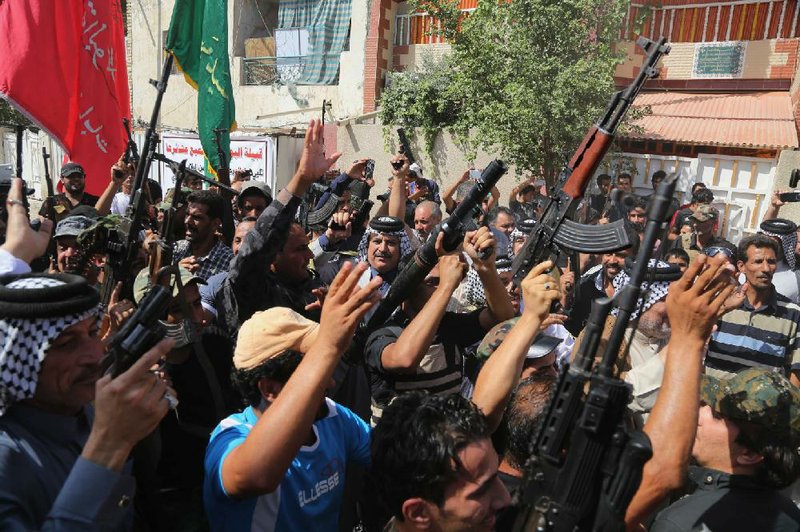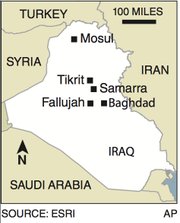BAGHDAD -- Thousands of Shiites from Baghdad and across southern Iraq answered a call to arms Saturday, joining security forces to fight the Islamic militants who have captured large sections of territory north of the capital and now imperil a city with a revered religious shrine.
The mobilization, urged by the nation's top Shiite cleric, took on a sectarian dimension that threatened to intensify Sunni-Shiite strife.
In Baghdad, fallout from the advance in the north was beginning to affect daily life for the city's 7 million inhabitants.
Some food prices rose dramatically. Army troops went house to house searching for militants and weapons in neighborhoods close to vital government installations. The streets of the capital were quieter than usual, and military and police checkpoints made extra efforts to check cars and passenger IDs.
The price increases were partly the result of transportation disruptions on the main road linking the capital with provinces to the north.
"We were not prepared for this sudden spike in the prices of foodstuff, vegetables and fuel," said Yasser Abbas, a government employee from Baghdad's sprawling eastern Sadr City district. "I do not know how the poor people in Baghdad will manage their life in the coming days.
"God be with them until this crisis is over because hunger is as dangerous as bullets."
Cooking gas quadrupled in price, to about $20 on Saturday from about $5 on Thursday for a 35-pound container. The dollar, normally stable in Iraq, spiked about 5 percent overnight. And the price of potatoes increased sixfold, to about $4.50 a pound.
In the meantime, dozens of men climbed into the backs of army trucks at volunteer centers, chanting Shiite religious slogans, hoisting assault rifles and pledging to join the nation's beleaguered security forces to battle the Sunni militants of the Islamic State of Iraq and the Levant.
"By God's will, we will be victorious," said one volunteer, Ali Saleh Aziz. "We will not be stopped by the ISIL or any other terrorists."
The volunteers were first taken to an assembly center in eastern Baghdad, where they were handed military uniforms. They later went to Taji, home of Iraq's largest military base north of Baghdad, to undergo basic training.
State-run television aired footage of the volunteers, still in their civilian clothes, running drills.
The Islamic State and its allies halted their advance within a two-hour drive to the north of Baghdad, and there was no indication that they were seeking to push farther toward the capital.
The rebel leader, Abu Bakr al-Baghdadi -- who had boasted that he would soon take the capital and press on to the Shiite heartland in southern Iraq -- fell silent as his followers worked to consolidate their gains in predominantly Sunni parts of the country, instead of trying to fight their way through more heavily defended, Shiite-dominated areas.
The Shiite mobilization unfolded against a backdrop of religious and nationalist fervor. State-run television aired a constant flow of nationalist songs, clips of soldiers marching or singing, as well as interviews with troops vowing to crush the militants. Other broadcasts included archival clips of the nation's top Shiite clerics and aerial shots of Shiite shrines.
Shiite cleric and political leader Ammar al-Hakim was shown on television networks putting on camouflaged military fatigues as he spoke to volunteers from his party, although he still wore his clerical black turban that designates him as a direct descendant of the Prophet Muhammad.
Prime Minister Nouri al-Maliki, a Shiite widely resented by Sunnis for his perceived sectarian policies, denied that the call by the Iranian-born Grand Ayatollah Ali al-Sistani was directed against Sunnis, saying it was meant to protect the country and its holy shrines.
"Talk of Sunnis and Shiites must be dropped," he said, calling for the unity of all Iraqis.
Many volunteers, however, said they had enlisted to protect their faith and shrines at risk in the city of Samarra north of Baghdad and elsewhere. The militants have threatened to march all the way south to the holy cities of Najaf and Karbala, home to two of the most revered Shiite shrines.
Al-Maliki himself appeared to give the standoff with the Islamic State a sectarian color, paying a surprise visit to Samarra on Friday and appearing on state-run television while praying there. The shrine was badly damaged in a bombing blamed on Sunni extremists in 2006. That attack sparked a wave of bloodletting between Sunnis and Shiites that lasted two years.
The bloodshed ebbed in 2008 after the U.S. troop surge, a revolt by moderate Sunnis against al-Qaida in Iraq and a Shiite militia cease-fire.
He also declared that Samarra would be the assembly point for the march north to drive out the militants, another religious incentive to Shiites.
Fighters from the al-Qaida splinter group, drawing support from former Saddam Hussein-era figures and other disaffected Sunnis, have made significant gains in the Sunni heartland north of Baghdad after overrunning Iraq's second-largest city, Mosul, on Tuesday. Soldiers and policemen have melted away in the face of the lightning advance, and thousands have fled to the self-ruling Kurdish region in northern Iraq.
On Saturday, insurgents seized the small town of Adeim in Diyala province after Iraqi security forces pulled out, said the head of the municipal council, Mohammed Dhifan. Adeim is about 60 miles north of Baghdad. There was no official confirmation of the loss of the town.
The territory essentially reconstitutes what the U.S. military, during the Iraq War, called the Sunni Triangle, an area where Sunnis predominated and which provided fertile ground for the rise of the Sunni insurgency. It was also the area that cost the Americans by far the most casualties of the war.
Jawad al-Bolani, a lawmaker and former Cabinet minister close to al-Maliki, said a military offensive was underway Saturday to drive the insurgents from Tikrit, although fighting in the area could not be confirmed.
Maj. Gen. Qassim al-Moussawi, spokesman for the Iraqi military's commander in chief, said Iraq's armed forces have "regained the initiative" in the north and northeast, blunting the Islamic State's advances and regaining control of some localities.
A key Sunni Muslim tribal leader said his forces are helping Iraq's Shiite-led government battle Islamist militants, but he called on U.S. military intervention to stop their advance.
"We've been fighting al-Qaida in Anbar for the past six months, and we're ready to fight for another six months, but we need American support," Sheikh Ahmed Abu Risha said in a phone interview from Ramadi in western Iraq. "The United States must take the decision to stage airstrikes against the militants or send troops again to Iraq, even if it's for a limited time."
Abu Risha leads the Awakening Council in Anbar province. Also known as The Sahwa or the Sons of Iraq, the councils were organized by the U.S. military in 2006 to fight al-Qaida during a civil war between Shiites and Sunnis.
As President Barack Obama considers possible military options for Iraq, Defense Secretary Chuck Hagel ordered the aircraft carrier USS George H.W. Bush to move from the northern Arabian Sea into the Persian Gulf.
Hagel's press secretary, Rear Adm. John Kirby, said the order will give the president added flexibility if military action is required to protect American lives, citizens and interests in Iraq.
Accompanying the carrier will be the guided-missile cruiser USS Philippine Sea and the guided-missile destroyer USS Truxtun. The ships were expected to complete their move into the Persian Gulf late Saturday.
The ships carry Tomahawk missiles that could reach Iraq. The Bush is carrying fighter jets that also could easily get to Iraq.
Meanwhile Saturday, Iranian President Hassan Rouhani said his Shiite nation stands ready to help Iraq if asked and did not rule out cooperating with the United States, adding that it has "no option but to confront terrorism."
He said Iran would "study if there is a demand for help from Iraq" but that no specific request for assistance had been made.
Entry of Iranian forces into Iraq "has not been raised so far," and "it's unlikely that such conditions will emerge," he added.
Iran has built close political and economic ties with Iraq since the 2003 U.S.-led invasion toppled Saddam's Sunni-led regime.
Rouhani said he and Obama have official -- and unofficial -- channels of communication that they use, although they have not done so regarding the current crisis in Iraq.
"America hasn't acted on this situation yet. Whenever the United States makes a move ... then we can think about cooperation with them in Iraq," Rouhani said.
Despite reports that members of the Quds Force, an elite unit of Iran's Revolutionary Guard Corps, had already been deployed to Iraq, Rouhani said Iran wanted to stay out of the fray if possible. But he called on other regional countries and international powers to help end the violence in Iraq.
Information for this article was contributed by Hamza Hendawi, Sameer N. Yacoub and Qassim Abdul-Zahra of The Associated Press; by Jason Rezaian of The Washington Post; by Rod Nordland and Alissa J. Rubin of The New York Times; and by Zaid Sabah and Caroline Alexander of Bloomberg News.
A Section on 06/15/2014


